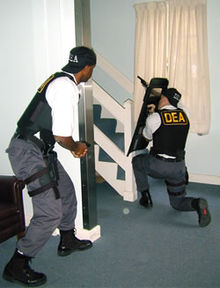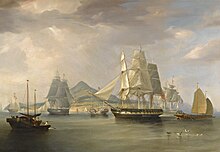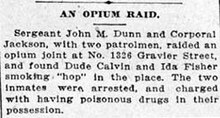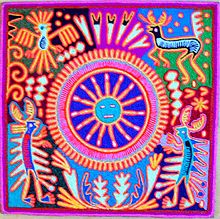Drug prohibition
[3] Examples include a range from caffeine found in coffee, tea, and chocolate, nicotine in tobacco products; botanical extracts morphine and heroin, and synthetic compounds MDMA and fentanyl.Nitrous oxide, or laughing gas is a dental anesthetic, also used to prepare whipped cream, fuel rocket engines, and enhance the performance of race cars.[7] In the Ottoman Empire, Murad IV attempted to prohibit coffee drinking to Muslims as haraam, arguing that it was an intoxicant, but this ruling was overturned soon after he died in 1640.[8] The introduction of coffee in Europe from Muslim Turkey prompted calls for it to be banned as the devil's work, although Pope Clement VIII sanctioned its use in 1600, declaring that it was "so delicious that it would be a pity to let the infidels have exclusive use of it".[18] Foreign traders, including those employed by Jardine Matheson and the East India Company, smuggled opium into China in order to balance high trade deficits.[19] Due to increasing pressure in the British parliament, the Liberal government under William Ewart Gladstone approved the appointment of a Royal Commission on Opium to India in 1893.After an extended inquiry, the Royal Commission rejected the claims made by the anti-opium campaigners regarding the supposed societal harm caused by the trade and the issue was finalized for another 15 years.In 1888, Broomhall formed and became secretary of the Christian Union for the Severance of the British Empire with the Opium Traffic and editor of its periodical, National Righteousness.As Broomhall lay dying, an article from The Times was read to him with the welcome news that an international agreement had been signed ensuring the end of the opium trade within two years.In 1906, a motion to 'declare the opium trade "morally indefensible" and remove Government support for it', initially unsuccessfully proposed by Arthur Pease in 1891, was put before the House of Commons.In the UK the Defence of the Realm Act 1914, passed at the onset of the First World War, gave the government wide-ranging powers to requisition the property and to criminalize specific activities.With the temporary powers of DORA, the Army Council quickly banned the sale of all psychoactive drugs to troops, unless required for medical reasons.However, shifts in the public attitude towards drugs—they were beginning to be associated with prostitution, vice and immorality—led the government to pass further unprecedented laws, banning and criminalising the possession and dispensation of all narcotics, including opium and cocaine.While originally intended to regulate the trade, it soon became a prohibitive law, eventually becoming legal precedent that any prescription for a narcotic given by a physician or pharmacist – even in the course of medical treatment for addiction – constituted conspiracy to violate the Harrison Act.[18] In Jin Fuey Moy v. United States,[33] the court upheld that it was a violation of the Harrison Act even if a physician provided prescription of a narcotic for an addict, and thus subject to criminal prosecution.In response to rising drug use among young people and the counterculture movement, government efforts to enforce prohibition were strengthened in many countries from the 1960s onward.A few developing countries where consumption of the prohibited substances has enjoyed longstanding cultural support, long resisted such outside pressure to pass legislation adhering to these conventions.[49] In January 2012 Colombian President Juan Manuel Santos made a plea to the United States and Europe to start a global debate about legalizing drugs.[50] This call was echoed by the Guatemalan President Otto Pérez Molina, who announced his desire to legalize drugs, saying "What I have done is put the issue back on the table.The response of the Home Office has been to create a temporary class drug order which bans the manufacture, import, and supply (but not the possession) of named substances.In the United States, Federal Bureau of Narcotics chief Harry Anslinger's opponents accused him of taking bribes from the Mafia to enact prohibition and create a black market for alcohol.[70] More recently in the Philippines, one death squad hitman told author Niko Vorobyov that he was being paid by military officers to eliminate those drug dealers who failed to pay a 'tax'.For instance, according to a report on the U.S. customs and border protections, the American industry, although banned the main usage of marijuana, was still using products similar such as hemp seeds, oils etc.Then, a customs collector[75] was to maintain the custody of imported marijuana at entry ports until required documents were received, reviewed and approved.Shipments were subject to searches, seizures and forfeitures if any provisions of the law were not met.In that same 20 year time period, the U.S. prison population tripled, making the U.S. the world leader in both percentage and absolute number of citizens incarcerated.[80] In particular, article 2(9) stipulates that activities may be exempt from the minimum provisions "when it is committed by its perpetrators exclusively for their own personal consumption as defined by national law."[86] In 2012, crime statistics in Victoria revealed that police were increasingly arresting users rather than dealers,[87] and the Liberal government banned the sale of bongs that year.In 2004, Australian citizen Schapelle Corby was convicted of smuggling 4.4 kilograms of cannabis into Bali, a crime that carried a maximum penalty of death.[91] Prohibition can increase organized crime, government corruption, and mass incarceration via the trade in illegal drugs, while racial and gender disparities in enforcement are evident.In 2016, the Johns Hopkins–Lancet Commission concluded that the "harms of prohibition far outweigh the benefits", citing increased risk of overdoses and HIV infection and detrimental effects on the social determinants of health.










Regulation of therapeutic goodsDrug Enforcement Administrationsumptuary legislationreligious lawrecreational useprescriptionamphetaminespsychoactive drugsanabolic steroidsipso jurealcohollist of countries with alcohol prohibitiontobaccoindoor smokingalcohol prohibitionUnited States (1920–1933)Finland (1919–1932)Norway (1916–1927)Canada (1901–1948)Iceland (1915–1922)Russian Empire/USSR (1914–1925)international treatypsychoactive substancealcoholic beveragesBrussels Conferencefirst treaty on opiumpsychoactive substancescaffeinenicotinefentanylpharmaceutical drugsmedicineclinical situationbronchopulmonary dysplasiathe Church of Jesus Christ of Latter-day SaintsBritish parliamentTea Act of 1773Nitrous oxidepsychoactiveWar on DrugsHuicholPeyoteShariaQur'anintoxicantshashish smokinghistory of Islamcannabisillegal drugsrecreational drugjuristsIslamic jurisprudencemedicinal and therapeutic purposesmental derangementFirst Opium WarOttoman EmpireMurad IVcoffeeharaamintoxicantPope Clement VIIICoffee CantatacoffeehousesRamathibodi IAyutthaya KingdomThailandRama IVstimulantsBritish colonyQing ChinaJardine MathesonEast India CompanySouthern ChinaLin Zexudestruction of opium at HumenTreaty of NankingPapaver somniferumPharmacy Act of 1868Pharmacy Act 1868General Medical CouncilpoppiesSan Franciscoopium denslaudanumtincturepanacearacial discrimination1897 Aboriginals Protection and Restriction of the Sale of Opium ActAboriginesmenstruationThomas BrasseyRoyal Opium CommissionSociety for the Suppression of the Opium TradeQuakersRev. Frederick Storrs-TurnerProtestantmissionariesJohn Glasgow KerrArthur E. MouleArthur Gostick ShorrockGriffith JohnLiberalWilliam Ewart GladstoneRoyal Commission on Opium to IndiaFar EastRoyal Commission on OpiumChina Inland MissionBenjamin BroomhallJames Laidlaw MaxwellThe TimesNew OrleansLouisianaInternational Opium ConventionArthur PeaseHouse of CommonsInternational Opium CommissionThe Haguedrug control treatyTreaty of VersaillesLeague of NationsnarcoticDefence of the Realm Act 1914First World Warmoral panicBritish Indian ArmyArmy Council
